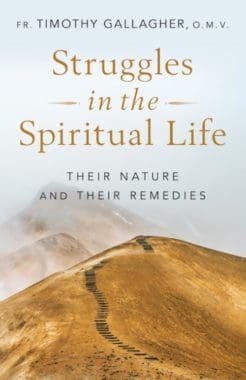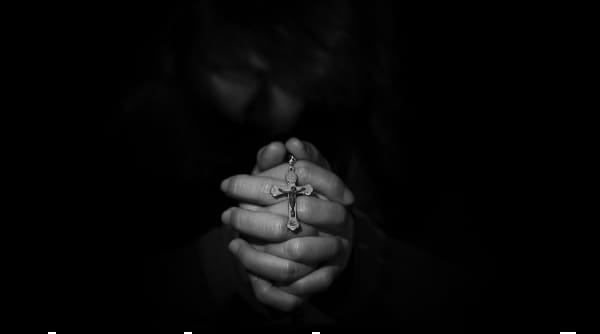“I Just Can’t Pray”
John looked out the window. Streetlamps and windows in neighboring homes lit the darkness of the approaching night. His gaze dropped to the desk before him. There, a few inches before his hand, lay the Bible. Normally at this time, he read from it for ten to fifteen minutes. Tonight, nothing in him wanted to do so.
He thought back to the beginning of the day. For months now, he had attended daily Mass before work. This morning, he had barely gotten himself to church and had paid little attention to the Mass, just wanting it to end.
Then John recalled the commute home from work. Usually, he would play a Rosary app as he drove. But this day the same pattern held: he had felt no desire to pray the Rosary and had listened to music instead.
Seated at his desk in the silence of his room, John grew troubled. Days like today were becoming more common. He was losing something. Something had to change.
A week later:
John opened the gate, approached the rectory, rang, and waited. A minute later, the door opened, and Father Reed welcomed him. John returned his greeting, crossed the vestibule, and entered the parlor, where he and Father Reed always met. They sat by the windows, their chairs facing each other. The afternoon sun filled the room, and subdued sounds of traffic created a quiet background. As usual, when he met Father Reed, John felt his heart lift.
For a few minutes, they spoke of John’s family, his wife, Jennie, and their children. Then Father Reed offered a prayer. When he finished, he settled in his chair, smiled warmly, and prepared to listen. This was John’s cue to speak.
For a moment, John gazed at Father Reed. His frailty was evident, and he looked all of his seventy-five years. But his heart had not changed. His physical sufferings had deepened the goodness and care for others that had long characterized his priesthood.
“When I last came, four weeks ago,” John began, “I was happy with my prayer. It seemed to be growing, and I felt that I was growing closer to God. Daily Mass, when I could get to it, made a real difference in the day. Somehow, it felt alive. The readings spoke to me, and I sensed the Lord’s presence when I received Communion. The Mass helped me to be more patient at work, a better husband and father, and . . . just happier. I liked listening to the Rosary app when I drove home from work, and I liked my prayer at the end of the day, the time I spent reading the Bible and making my examen. This prayer brought Jennie and me closer, and we both loved it.”
“Yes, I remember you telling me about this,” said Father Reed.
“But now I feel like I just can’t pray. It’s frustrating. I don’t know what’s going on, and I don’t like it.”
“Can you tell me more about what’s happening?” Father Reed asked.
“Well, I don’t feel God’s closeness in the same way. I go to daily Mass because I want to be faithful, but it doesn’t energize me the way it used to. I try to pray the Mass, but my mind wanders, and I feel bad about that. And to be honest, I don’t really want to pray the Rosary during the commute. Some days I don’t. I pray before retiring, but it’s simply to get it done. I’m tired, and what I really want is to go to bed and sleep.” John smiled a bit wanly, “Not a very pretty picture, is it?”
“What are your days like now?” Father Reed asked.
“That’s a good question,” John answered. “The days are full. Work has been busy. Jennie has had the flu recently, and she has needed extra help with the children. Actually, now that I talk about it, life has been pretty much nonstop for several weeks.” He paused and looked at Father Reed. “To be really honest, though,” he said sheepishly, “it isn’t just that. Football season has started, and I’ve been staying up at night watching the games, even reruns when there is no game that evening. Then I watch other things, or I go on the phone. Sometimes it’s quite late before I get to bed.”
“John, several times now you’ve talked about being tired, wanting to sleep, and getting to bed at night. How is your energy these days?” Father Reed asked.
“Not good. I’m always tired. Things irritate me more easily, and everything weighs more. Also, when I don’t get enough sleep, I don’t exercise. And when I don’t exercise, I don’t eat properly either.”
“Do you think that your prayer, your tiredness, and the demands on your energy are in any way linked?”
John smiled wryly and said, “It seems pretty obvious, doesn’t it? Yes, I’m sure that they are.”
“Can you think of anything else that has changed in recent weeks that might make prayer harder?”
John reflected for a moment. “No, not really,” he said, “I think it comes down to being more tired.”
“If that’s so, what do you think might help you pray better?”
John laughed. “You don’t miss much, do you? If I got more sleep at night, it would help.”
“That sounds right to me,” Father Reed said, “and I don’t think we should assume deeper problems until we eliminate this one. The body is important in prayer, and proper care of it helps a great deal in the spiritual life. In a way, it’s encouraging that there is no serious problem in your relationship with the Lord and your prayer. Most likely, you just need a better rhythm of life. Because work and family are making more demands now, managing your time is even more important.”
John smiled. “I’ll give it a try,” he said, “and I’ll let you know how it goes.”
Yes, the spiritual life is easier when we take wise care of the body. If you struggle in the spiritual life, ask first: How is my physical energy? Do I get enough sleep? Do I exercise sufficiently? Does my diet sustain my energy? If the answers are positive, you may presume that spiritual struggles, should you experience them, arise from a different cause. But it is wise to ask these questions before you presume this.
Sometimes, life simply makes demands on our energy. If John’s pace at work increases still more, if his wife’s illness grows more serious and long-lasting, if he himself faces physical issues, if the children’s needs increase, and the like, then his energy for prayer will be less. God never asks the impossible! John, or any one of us in similar circumstances, can only do our best to care for our energy. Such expenditures of energy, accepted out of love for our vocation—in this case, marriage and fatherhood—bring us closer to God, though our prayer may be more tired.
Even in such situations, however, God asks us to care for the body as best we can. And this will bless our prayer.
Saint Teresa of Avila writes, “Take care, then, of the body for the love of God, because at many times the body must serve the soul.” Take care of the body—why? For what reason? “For the love of God.” The soul needs the body. Prudent care of the body resolves many struggles in the spiritual life.
Like you, I have a daily rhythm of prayer. I chose it, and I adhere to it because I know its benefits. But some days—and I doubt I am alone in this!—I feel that “today, I just can’t do it.” What often solves this is exercise. I exercise, and then I am ready to pray. I want to pray. The problem never was lack of desire for prayer; it was lack of attention to a need of my physical humanity.
Years ago, when I made the Ignatian Spiritual Exercises, the Jesuit who guided my group said, “For many of us, having a spiritual life comes down to one thing: getting to bed on time.” Wise words!
In Ignatian terms, John’s issue is nonspiritual (that is, natural, human, physical) desolation (that is, heaviness of heart) caused by a diminishment of physical energy. The remedy is evident.
+
This article is adapted from a chapter in Struggles in the Spiritual Life by Fr. Timothy Gallagher, O.M.V. which is available from Sophia Institute Press.

Art for this post: Cover and featured image used with permission.




